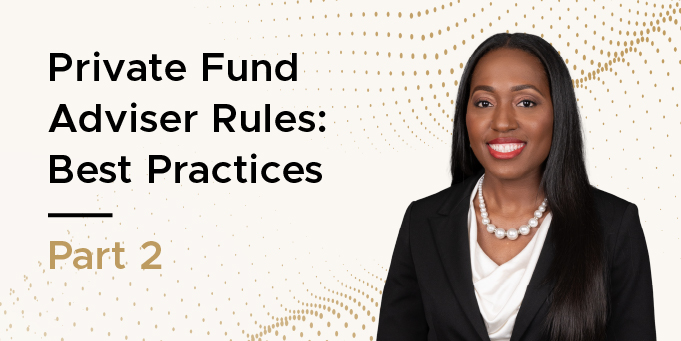
Regulatory Scrutiny of Private Fund Disclosures
- Published
- Nov 10, 2021
- Share
Regulatory oversight of investment advisers in the private fund sector is not a new development. Currently, investment advisers meeting certain criteria are required to register with the SEC under the Investment Advisers Act of 1940. More recently, the Dodd-Frank Wall Street Reform and Consumer Protection Act of 2010 (“Dodd-Frank”) added to the types and number of advisers required to register with the SEC in an effort to provide more transparency into the books and records of private funds and to enhance consumer protection . Since Dodd-Frank there have been further amendments or modifications to existing regulations to enhance transparency, albeit on a smaller scale. So, when the chairman of the SEC alludes to potential reforms in the private funds and investment management space, it inevitably gets the attention of private fund managers.
Potential reforms within the private fund sector are one of several themes expected to be a priority of the SEC under President Biden. In a statement given before the United States Senate Committee on Banking, Housing and Urban Affairs on September 14, 2021, Chairman of the SEC Gary Gensler cited America as having the “largest, most sophisticated, and most innovative capital markets in the world,” emphasizing that this cannot be taken for granted. Chairman Gensler highlighted new technologies that continue to evolve in the world of finance for investors and businesses and allow for more retail investors to have access to capital markets than ever before. He also acknowledged growing competition from developing capital markets abroad. This ever-expansive reach of capital markets underlies the SEC’s central mission to protect investors, facilitate capital formation and ensure fair, orderly and efficient markets. Transparency and competition in these markets are key to ensure the success of these goals.
One of the pillars of transparency revolves around disclosures. Referencing the work of Franklin Delano Roosevelt and Congress to reform the securities markets in the 1930s, one of the guiding principles of capital markets is that the investor decides what risks they are willing to take. Accordingly, it is the obligation of capital-raising companies to share information with investors on a regular basis. The substance of these disclosures changes over time, with some of the more recent additions including management discussion and analysis, risk factors and executive compensation. In today’s market, investors are looking for “consistent, comparable, and decision-useful disclosures around climate risk, human capital and cybersecurity” – for which Chairman Gensler has asked his staff to develop proposals for consideration, analysis and public comment.
Focusing on potential reforms around private investment funds and investment managers, Chairman Gensler asked his staff to consider ways to determine what information stands behind the claims of a growing number of funds that market themselves as “green,” “sustainable” and “low-carbon,” among others. In addition, staff have been advised to develop proposals around cybersecurity risk governance, including an entity’s practices and precautions around cybersecurity, referred to as cyber hygiene, as well as incident reporting. Enhancing disclosures around the conflicts of interest managers may have and information around fees that are charged was another topic discussed, with the goal that such disclosures lead to better investment decision-making, greater transparency and competition in the space.
In a House testimony earlier this year, Chairman Gensler noted that the private fund sector, particularly private equity and venture capital funds, exhibited tremendous growth both in the number of funds and the aggregate assets under management over the last five years. The evolving strategies, structures and business practices of these entities create new risk for markets and investors, and he noted that it is important to hold investment advisers accountable, especially when violations are found. While there is no self-regulatory organization for investment advisers, it is the SEC’s responsibility to evolve with the industry and, as such, Chairman Gensler asked his staff for recommendations by way of enhanced reporting, disclosure and insight through Form ADV, Form PF, or other reforms. These disclosures would focus on “investment risks, conflicts of interest, fees and expenses, liquidity, valuation of assets and controls around material non-public information.” Leading experts in the financial regulation space envision that such reform could be implemented through rulemaking, using a template to streamline fee and expense reporting, similar to the one provided by the Institutional Limited Partners Association, or additional questions added to the Form-ADV, defining what is a fee and what is an expense.
In a recent statement before the Financial Stability Oversight Council on October 21, 2021, Chairman Gensler re-emphasized the need for disclosures in the public and investment fund sector as a means to “facilitate consistent, comparable, and decision-useful disclosures from companies. This helps investors, and it helps companies. Thus, SEC staff is developing a proposal for the Commission’s consideration.”
The SEC published its annual regulatory agenda in June of this year in which its proposed rulemaking areas did not specifically list private fund fees and expenses; however, the publication of the regulatory agenda preceded Chairman Gensler’s more recent remarks on regulatory areas of focus. EisnerAmper will continue to monitor developments in this area and provide updates accordingly.
What's on Your Mind?
Start a conversation with Eugene
Receive the latest business insights, analysis, and perspectives from EisnerAmper professionals.











